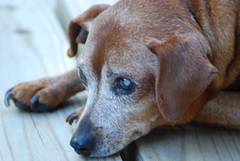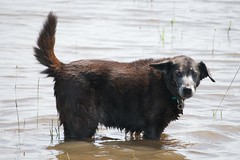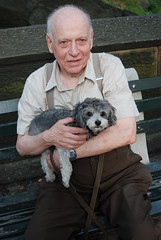Is the sky falling down? Fireworks and your animal friend.
Thursday, June 23rd, 2016 Soon we will celebrate July 4th. Unfortunately for many of our animal friends this can also be a stressful time because of the loud fireworks that many people set off. For many animals, fireworks can seem like the world is ending and every year animals injury themselves by trying to escape out of houses or by running away and getting lost or hit by cars.
Soon we will celebrate July 4th. Unfortunately for many of our animal friends this can also be a stressful time because of the loud fireworks that many people set off. For many animals, fireworks can seem like the world is ending and every year animals injury themselves by trying to escape out of houses or by running away and getting lost or hit by cars.
If you have an animal who is afraid of fireworks or a new animal in your household this is a good time to be home with them if at all possible. Here are some things you can do to avoid stress and injury to your furry companion. Not everything works for every animal and many of these suggestions can be used in combination. Some animals get such severe anxiety that they need to be sedated with medication, so if your animal falls under that category this is the time to call your veterinarian. Most of the suggested products below can be purchased at natural pet supply stores or online by clicking on the links.
- Put on loud music or turn up the television to cancel out the noise. If your animal is prone to stress I would suggest classical or other calming music.
- Use pheromone sprays such as Feliway
for cats and D.A.P. aka Dog Appeasing Pheromone
for dogs to calm them down. The comfort zone products are the same as the vet products that are called just Feliway and DAP but are cheaper and can be bought at pet supply stores.
- Spray a natural lavender product around the house. Lavender can be very calming but make sure you use a natural product and not one full of chemicals. Do not spray directly on your animal.
- Bach flower remedies such as Rescue Remedy
can be very helpful for stressed animals. These are homeopathic in nature and very safe for even the oldest of animals. Put a few drops in their mouth or on the ear and a few drops in all the drinking bowls in the house.
- My Kingdom of Basil Calm and Peaceful formula is great for taking the edge off anxiety in dogs. Animals’ Apawthecary’s Tranquility Blend
works well for anxiety in both cats and dogs. However check with your veterinarian if your animal is on any medications or has any major health issues before using these.
- Wearing a T-shirt, Thundershirt
, or Anxiety Wrap can help your dog if they have problems with anxiety from fireworks. It sounds weird I know, but it actually does work.
It is based around the ideas from Tellington TTouch of using an ace bandage. Wearing the shirt enhances your dog’s sense of their own body and makes them feel more confident in their movements and behavior. You can use a snug fitting human T-shirt, a Thundershirt
, or an anxiety wrap.
- If you are home, talk to your animal calmly and rub them gently. If they become agitated try to stay calm. Your stress will only make them more stressed.
- Make sure all windows and doors are closed. Do not leave your animal outside.
Have a wonderful new year and thank you for visiting!





 Beautiful, strong and proud, he leaps across the field with graceful steps, able to turn on his heals in a second’s time if something fun to chase crosses his path. But slowly the gray hairs form on his muzzle and his step slows, his eyes are no longer as clear as in his youth and he no longer hears the door when it opens.
Beautiful, strong and proud, he leaps across the field with graceful steps, able to turn on his heals in a second’s time if something fun to chase crosses his path. But slowly the gray hairs form on his muzzle and his step slows, his eyes are no longer as clear as in his youth and he no longer hears the door when it opens. Gradually as a family we realized that there was a large problem with acceptance and the first thing to do was accept Jake for where he was at. We also made some changes to our home and routines to improve things. We changed our schedules so that we were able to let him out at the same times every day to poop and pee. One very important change was to put up a gate between our two floors so that Jake could not go up or down the stairs on his own. In the morning we would help him down the stairs and in the evening we would help him up so he could sleep in my son’s room and do his job of protecting him. Because the gate was there he knew that we were purposely stopping him from going on the stairs and he no longer felt that he had to follow us where he could not.
Gradually as a family we realized that there was a large problem with acceptance and the first thing to do was accept Jake for where he was at. We also made some changes to our home and routines to improve things. We changed our schedules so that we were able to let him out at the same times every day to poop and pee. One very important change was to put up a gate between our two floors so that Jake could not go up or down the stairs on his own. In the morning we would help him down the stairs and in the evening we would help him up so he could sleep in my son’s room and do his job of protecting him. Because the gate was there he knew that we were purposely stopping him from going on the stairs and he no longer felt that he had to follow us where he could not. Love me for who I am today
Love me for who I am today